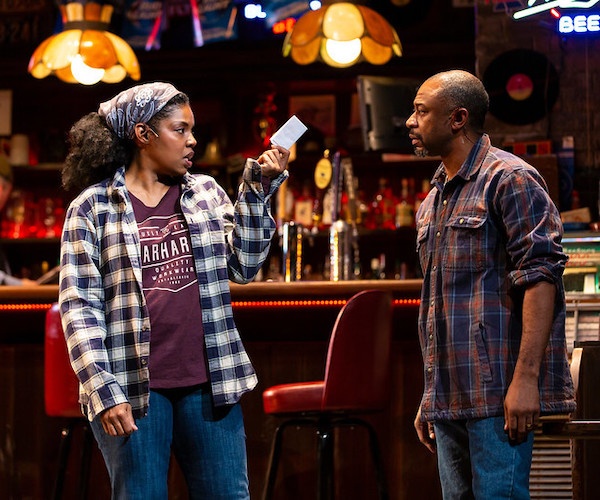Theater Review: “Sweat” — Icarus’s Children
By Bill Marx
For me, Sweat hits its riveting stride in its second half, when the pressures of the strike tests the relationships of its working-class characters.

Marianna Bassham, Tyla Abercrumbie, and Jennifer Regan in the Huntington Theatre Company’s production of Sweat. Photo: T. Charles Erickson.
Sweat by Lynn Nottage. Directed by Kimberly Senior. Staged by Huntington Theatre Company at the venue of the Arts / Huntington Avenue Theatre, 264 Huntington Avenue, Boston, MA, through March 1.
Children of the Sun, an adaptation of Maxim Gorky’s 1905 play by Russia’s Red Torch Theatre, directed by Timofey Kulyabin. An offering from Stage Russia, “an intercultural project that films performances presented by the finest theater companies in Russia and distributes them in HD, translated and subtitled, into cinemas, arts centers and universities.” At the Bright Family Screening Room, Emerson Paramount Center, 559 Washington Street, Boston, MA, Feb 7 through 9.
It is unusual, but perhaps telling, that two productions have come around in which the working class is damned angry. In American plays, aside from Clifford Odets’s Waiting for Lefty, underclass rage is usually internalized, more about self-destruction than system-shaking, as it is in Lynn Nottage’s powerful 2016 drama Sweat, which grew out of interviews she did with workers in Reading, PA. Part of what the playwright is up to is making sense of the dark mystique of Trump, though she is also dramatizing the debilitating (and ongoing) fallout from a Wall Street–blessed transformation of the American economy. Gorky’s 1905 Children of the Sun, written in prison after he was rounded up in the brutal “Bloody Sunday” suppression of worker demonstrations, is set in 1892, but he uses the year’s cholera outbreak to put mistreated peasants and servants on the march, in the final scene assaulting well-meaning but feckless intellectuals, who know something is happening but don’t know what it is. Both scripts end with violent acts, both focus on the hapless victims of social transition. Each makes apt use of the metaphor of blindness. The rich, semi-rich, and poor are equally blind to reality.
Compelling as both dramas are, they are not without their flaws. “You make these new, original people sing their songs to second-hand music,” Chekhov said to Gorky. Nottage draws real strength from Sweat‘s documentary roots but, especially in the first half, her research is awkwardly wedged into the confines of a rigidly realistic play. Factoids and debating positions are stuck into breezy-esque conversations in the play’s locale, a bar in Reading, populated by the workers in a steel tubing factory. White and black, male and female, they complain about working conditions but take their steady employment and decent salaries for granted, as they have for generations. Jumping from 2008 to 2000 and then back to 2008, revolving around a tragic act of violence, Sweat chronicles the meltdown of their way of life. After rounds of layoffs, the “vipers” who own the factory demand a 60% cut in the workers’ salaries (threatening to move the plant to Mexico). The union strikes and existence craters; there is the predictable rise in drug use, alcoholism, alienation, etc. Politicians are indifferent, while those who want to climb up the ladder, such as bar helper Oscar, whose family comes from Colombia, see an opportunity to get ahead by becoming a “scab.”
For me, Sweat hits its riveting stride in its second half, when the pressures of the strike test the relationship among a trio of women, good friends until Cynthia (Tyla Abercrumbie), who is black, becomes part of management, leaving her white chums, a jealous Tracey (Jennifer Regan) and despairing Jessie (Marianna Bassham), out of the loop. Meanwhile, Tracey’s son Jason (Shane Kenyon), and his friend, Cynthia’s son Chris (Brandon G. Green), grow desperate as the strike goes on, their frustration commented on by the salt-of-the-earth Greek chorus of a barkeep, Stan (Guy Van Swearingen). The guy is grateful that his leg was injured at the plant, saving him from a life of physical toil. Completing the dejected crew is Brucie (Alvin Keith), Cynthia’s estranged husband, who has drifted into drugs. The choices for Nottage’s workers seem to be to either slide into drug- and alcohol-fueled passivity or to explode at their predicament with irrational rage—not at the powerful, but at those with none.

Tyla Abercrumbie and Alvin Keith in the Huntington Theatre Company’s production of Sweat. Photo: T Charles Erickson
The Huntington Theatre production is sturdily directed by Kimberly Senior and generally well acted, though there could have been more collective tension generated as the bad news builds, suggestions of a tragic inevitability. Jennifer Regan brings welcome combative grit to Tracy and Tyla Abercrumbie gives a nimble portrait of an anguished woman caught between sides. Guy Van Swearingen does his best to add some avuncular zest to Stan’s relentless sanity. Cameron Anderson’s bar looks suitably lived in.
Mainstream critics natter on about the play’s timeliness because it suggests how Trump made it into the White House. But Nottage does more than that, and her points could make some viewers uncomfortable. For example, NAFTA earns a four-letter epithet in the script. Concerned (?), the HTC program note about “What Happened” presents a defense for “a semi-guilty scapegoat for valid working-class frustrations.” There is a quotation from the director of research at a Washington, DC, think tank, the Economic Policy Institute: “NAFTA is just this very visible political symbol that people take as a stand-in for all the pressures globalization put on American workers.” (Given the script’s subject, why don’t we hear from a labor leader on NAFTA and “valid working class frustrations”?) In fact, I don’t remember Nottage’s Stan attacking globalization, but Wall Street. Part of “what happened” is that the healthy 401Ks of many of the now aging segment of the theater-going public were fattened by American industries enriching themselves by putting the squeeze on their workers. Part of that calculated effort involved a successful effort to weaken unions, which Sweat notes. The decline of American unions has been going on for decades, under Democratic and Republican administrations. One of the most effective ways workers have to fight against their mistreatment and exploitation, including globalization, has been systematically undercut.
That reality is why I wanted to talk about Gorky’s Children of the Sun. Ironically, the Red Torch Theatre’s staging removes the script’s lower-class characters, does away with the cholera outbreak, and excises the violent ending. Updated (absurdly and unconvincingly) to Stanford University in 1999, the adaptation focuses on the emotional implosion of a quartet of Russian brainiacs, victims of the dehumanizing effects of technology (although there’s a prophetic glimpse of Putin’s arrival in 2000). Gorky’s original play, clumsy as it can be, brings people of affluence and poverty into direct conflict. Sweat sticks with the workers; we have no scenes in which the union faces off with the corporate “vipers.” The times call for scripts that bring our sharply polarized factions together — to square off, dramatically speaking. (Nottage says she wanted her play to stimulate conversation between sides.)
Of course, those confrontations might upset audience members, which Gorky’s play did at its premiere. A leading Russian theater critic charged that the production “spit in the faces of the intelligentsia.” Ah, those were the days. Could that ever happen today? Our stages daring to challenge, alarm, even insult, paying customers rather than soothe them? Wouldn’t that be a way of galvanizing resistance? Sounds so un-American in our age of branding. But Sweat and Children of the Sun suggest that, in times of crisis, theater has to leave its comfort zones.
Bill Marx is the editor-in-chief of The Arts Fuse. For over three decades, he has written about arts and culture for print, broadcast, and online. He has regularly reviewed theater for National Public Radio Station WBUR and The Boston Globe. He created and edited WBUR Online Arts, a cultural webzine that in 2004 won an Online Journalism Award for Specialty Journalism. In 2007 he created The Arts Fuse, an online magazine dedicated to covering arts and culture in Boston and throughout New England.
Tagged: Children of the Sun, Huntington-Theatre-Company, Lynn Nottage, Maxim Gorky

